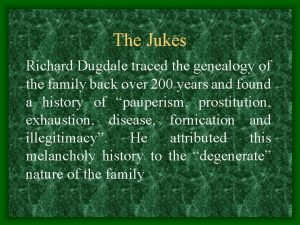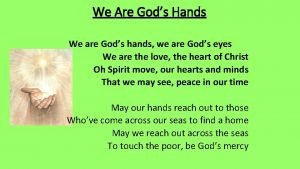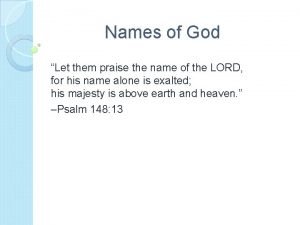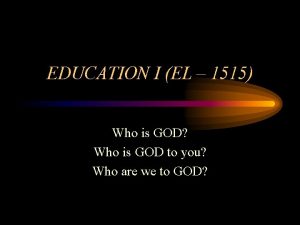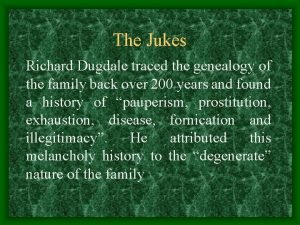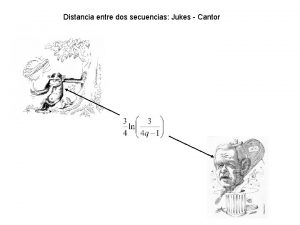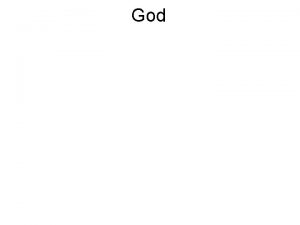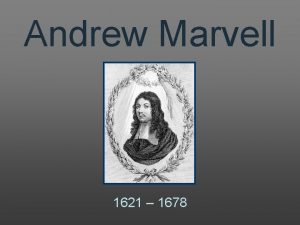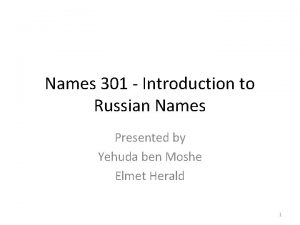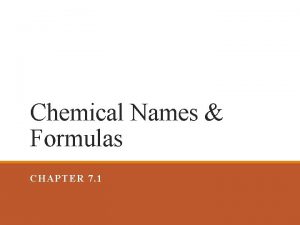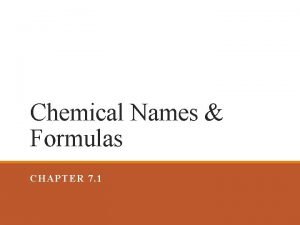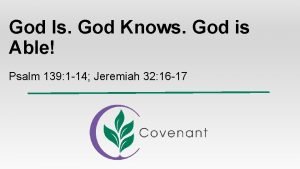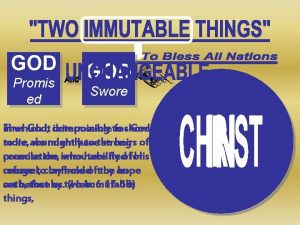Andrew Jukes The Names of God Introduction Chapter


![Looks like a reasonable [re]construction of the verse, right? “He that dwells in the Looks like a reasonable [re]construction of the verse, right? “He that dwells in the](https://slidetodoc.com/presentation_image_h2/c20810df0beee026b27e66801fea016e/image-3.jpg)



















- Slides: 22

Andrew Jukes: The Names of God ~ Introduction & Chapter 1 ~

Aren’t the names all the same? “He that dwells in the secret place of ____ shall abide under the shadow of _____. I will say of ____, He is my refuge and my fortress; ____, in him will I trust. ” Psalm (91: 1 -2) Names The LORD The Almighty My God The Most High Do the order in which the names appear, or the use of the names themselves, have any significance or are they all equivalent and interchangeable as “titles”?
![Looks like a reasonable reconstruction of the verse right He that dwells in the Looks like a reasonable [re]construction of the verse, right? “He that dwells in the](https://slidetodoc.com/presentation_image_h2/c20810df0beee026b27e66801fea016e/image-3.jpg)
Looks like a reasonable [re]construction of the verse, right? “He that dwells in the secret place of the Almighty shall abide under the shadow of the LORD. I will say of my God, He is my refuge and my fortress; the Most High, in him will I trust. ” Psalm (91: 1 -2) We could perhaps find other verses which say similar things in connection with those names, but the verse actually reads…. . : [next slide]

Actual verse: “He that dwells in the secret place of the Most High shall abide under the shadow of the Almighty. I will say of the LORD, He is my refuge and my fortress; my God, in him will I trust. ” Psalm (91: 1 -2)

Names of God in Hebrew The LORD = Yahweh (Jehovah) God = El / Elohim Most High God = El Elyon God Almighty = El Shaddai

Verse with Hebrew names: “He that dwells in the secret place of Elyon shall abide under the shadow of Shaddai. I will say of Yahweh, He is my refuge and my fortress; my Elohim, in him will I trust. ” Psalm (91: 1 -2) • These are the names that we need to keep in mind to get into the biblical and Hebraic mindset of what God’s names are and what they say about Him. • Sometimes the English just makes it a little too easy to ignore or skip over them as “just another title”. So purposefully try to translate these back into Hebrew in your mind each time that you read one of God’s Names.

Especially recognize, and change in your mind when you read, that “the LORD” stands in place of God’s one and only proper name: Yahweh. “The Lord” is not even a proper ‘translation’ for Yahweh (because it is a personal name), and is more suited to translate a different name of God: Adonai (which will be discussed later). And there is no word “the” in the text in any case. It does not read “I will say of the Yahweh, He is my refuge” but rather “I will say of Yahweh…” The reading “the LORD” is not a translation at all, but rather a stand in for Yahweh (for whatever reason that was done).





la / mhla El / Elohim There is a technical distinction between El and Elohim. EL (Aleph. Lamed - la) means Mighty/Powerful or “Mighty One” (Cf. Joshua 22: 22 & Psalm 50: 1; NASB). Elohim/ELHM (Aleph-Lamed-Hay-Mem – mhla) is the plural form of Eloah (hla) which possibly comes from a different stem. Jukes suggests that Eloah comes from the similarly spelled verb ‘Alah’ (hla) meaning to swear an oath (in a covenant) although it still is connected to EL (la) deriving its meaning to some degree (directly or indirectly) from EL as Mighty/Poweful One. Jukes nicely suggests a tie between the two words/meanings in that oaths (Alah - hla) are put into effect and sworn by the name of the greater (more mighty; EL - la) one as mentioned in Hebrews 6: 16, “For men swear by one greater than themselves, and with them an oath given as confirmation is an end of every dispute”. See footnote #3 on pgs. 18 -19 for his discussion on that.

Elohim – Why is it plural? • Elohim is a plural form, Eloah is a singlular form. • Eloah is used mostly in the book of Job with only a few occurrences outside it - in Psalms and a few other places. Almost every where else Elohim is used. • With Elohim we must examine why it is plural. A few times it is used as a “proper numerical plural” when designating “false gods” (false elohim). However, as Jukes notes, the majority of the time when referring to the one and only God and Creator singular verbs and adjectives are used to modify the plural Elohim, indicating that it is talking about a single being/person. • Here we must explore the distinction between the Hebrew plural of quantity and plural of quality.


From E. W. Bullinger’s Companion Bible Ecclesiastes 12: 1 Literally reads “thy Creators”. Hebrew plurals can be an intensive, called the “Plural of Majesty”, indicating plurality of quality not quantity. Or the plural may be taken to indicate a veiled reference to the Trinity – yet to be fully explained to God’s people. Genesis already plainly says “let us create man in our image”, thus “thy Creators” could be a reference back to

Proverbs 30: 3 Qodeshim = Holy Ones. This Hebrew plural is the intensive ‘Plural of Majesty’ meaning the MOST Holy One. Proverbs 9: 10

Hosea 11: 12 Isaiah 54: 5 Literally reads: “Thy Makers are thy Husbands”. Plural of Majesty or reference to the Triune Maker, “us”, in Genesis.

Psalm 149: 2 also: http: //www. hebrew 4 christians. com/Names_of_G-d/Trinity/trinity. html

Covenant within the Trinity: The remainder of the chapter Jukes gives Scriptural examples to back up the idea of Elohim being a Covenant God. The mystery of the Trinity is implicit in Elohim, and Jukes argues that before, and even above, being a covenentally faithful Elohim to His people, that God even made a covenant with Himself within the Trinity between the Father, Son, and Spirit to redeem all mankind. We know that God planned everything from the very beginning, even before he made man. See the Scriptures of God’s purpose from the foundation of the world: [next slide]

From the foundation of the world: Revelation 13: 8 – “All who dwell on the earth will worship him, whose names have not been written in the Book of Life of the Lamb slain from the foundation of the world. ” Matthew 13: 35 - “that it might be fulfilled which was spoken by the prophet, saying: “ I will open My mouth in parables; I will utter things kept secret from the foundation of the world. ” Ephesians 1: 4 – “He chose us in Him before the foundation of the world, that we would be holy and blameless before Him In love. ” The 1 Peter 1: 20 – “For He was foreknown before the foundation of the world, but has appeared in these last times for the sake of you. ” Hebrews 4: 3 – “His works were finished from the foundation of the world. ”

Perfect love within the Trinity: Jukes argues, quoting Augustine, that God first demonstrated perfect love, as a God of Love, within the Trinity between Father, Son, and Holy Spirit. “Into this mystery, however, I do not here enter, further than to say, with St. Augustine, that, if God is love, then in God must be a Lover, a Beloved, and the Spirit of love, for there can be no love without a lover and a beloved. And if God be eternal, then there must be an eternal Lover, and an eternal Beloved, and an eternal Spirit of Love, which unites the eternal Lover to the eternal Beloved, in a bond of Love which is eternal and indissoluble. The relationship in God, in and with Himself, is one in which there can be no breach. From the beginning God is "Elohim, " in covenant-union with Himself for evermore. ” (Pg. 20) And it is in that perfect bond of love that God the Father swore and made an oath with the Son to make him a Priest in the order of Melchizedek: “The LORD has sworn And will not relent, “You are a priest forever according to the order of Melchizedek” (Psalm 110: 4). This is the High Priesthood of Jesus revealed to us in Hebrews, of the Risen Christ, and yet we also know that it was planned ahead of time that Christ fulfill this role before the world began. And if Jukes is correct in that God first loved within Himself, the Trinity, and the Father made the covenant to redeem mankind with Jesus, his only Son, before the world began on our behalf (and He is a far more faithful recipient & keeper of the Covenant than mankind has been) then we can perhaps see a glimpse of this perfect harmony, love, and covenant faithfulness within the Trinity when Jesus says: “for You loved Me before the foundation of the world” (John 17: 24).

It is that covenant love and relationship within the Trinity that Jukes suggests lies within the full implications of the meaning of Elohim as a covenant and Triune God. Jukes’ biggest points about Elohim in Chapter 1 are about the plurality of the Trinity shown in Elohim and the covenant aspect of Elohim’s meaning. Jukes does not stay at the surface, he digs deep into the intended meaning and truths that Scripture are pointing out to us, even if they are not always obvious. This understanding only comes from careful consideration of Scripture, and Jukes gives several examples that we will discuss next time when we finish the rest of Chapter 1.
 Richard dugdale theory
Richard dugdale theory We are god's hands
We are god's hands Praise names of god
Praise names of god Names of god
Names of god Dichlorine octoxide formula
Dichlorine octoxide formula Machine learning andrew ng
Machine learning andrew ng Andrew ng introduction to machine learning
Andrew ng introduction to machine learning Introduction to machine learning andrew ng
Introduction to machine learning andrew ng Unit 1 what's your name
Unit 1 what's your name Hình ảnh bộ gõ cơ thể búng tay
Hình ảnh bộ gõ cơ thể búng tay Slidetodoc
Slidetodoc Bổ thể
Bổ thể Tỉ lệ cơ thể trẻ em
Tỉ lệ cơ thể trẻ em Voi kéo gỗ như thế nào
Voi kéo gỗ như thế nào Glasgow thang điểm
Glasgow thang điểm Alleluia hat len nguoi oi
Alleluia hat len nguoi oi Các môn thể thao bắt đầu bằng tiếng nhảy
Các môn thể thao bắt đầu bằng tiếng nhảy Thế nào là hệ số cao nhất
Thế nào là hệ số cao nhất Các châu lục và đại dương trên thế giới
Các châu lục và đại dương trên thế giới Công thức tiính động năng
Công thức tiính động năng Trời xanh đây là của chúng ta thể thơ
Trời xanh đây là của chúng ta thể thơ Cách giải mật thư tọa độ
Cách giải mật thư tọa độ Phép trừ bù
Phép trừ bù
